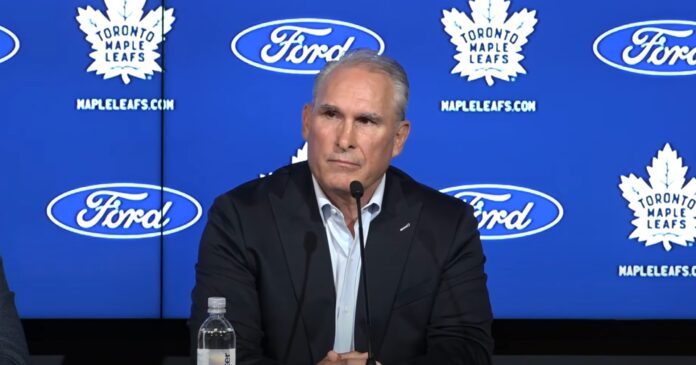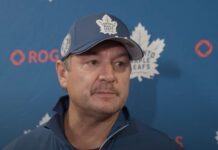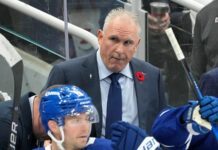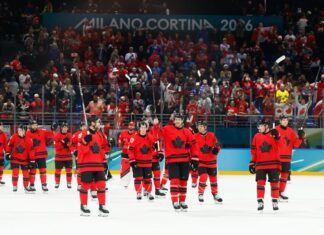
At his introductory press conference as the Maple Leafs’ new head coach, Craig Berube discussed his decision to take the job in Toronto, his approach to instilling accountability, his early view of the club’s roster, and the identity of his teams.
Opening Statement
Berube: First, I want to thank ownership, Brad, and Brendan for giving me the opportunity to become the Maple Leafs head coach.
It is a huge honour, obviously. It is a great franchise — Original Six. I had the opportunity to play here a little bit, way back in the day. It is nothing but first-class here. It is a first-class organization. I am very honoured to be the head coach.
What do you think of the Leafs team that just finished the season? There is a lot of speculation about change. What do you think of what you saw, and what do you think of the core players going forward?
Berube: That was one of the attractions. The core player group is great here. They have some great players here. That was definitely one of the attractions to come and coach this team.
Watching the playoffs this year with them, there was already that change kind of going on with how they want to be built and play. That is Brad bringing that in.
Talking with Brad and Brendan, we are on the same page. I think that is important. That was one of the big attractions: We have some real good players here.
Can you talk about who has reached out to you on the team so far? Who have you spoken to over the last few days since you were named coach?
Berube: I have made contact with most of the team, to be honest with you, on the phone. I met some guys in person here, too. I talked to pretty much everybody on the team already. It has been great. Great support. I am looking forward to working with these guys.
The Leafs are known for 100-point seasons under Sheldon Keefe but couldn’t get it done in the playoffs. What has to be different once you get to the next spring? How do you get the group to a spot it hasn’t gotten to yet?
Berube: That stuff is in the past, to be honest you. I am focused on now and the future. I am going to bring my own style in terms of how we want to play the game.
Brad and Brendan are on board with that. They think similar to myself. All I can do is focus on — now and going forward — how we want to build a team here and how we want to look on the ice.
There were a lot of teams interested in you. You spent the year waiting it out. What was the driving force that led you to pick Toronto?
Berube: If you look at the roster, first and foremost, as I have talked about, there are some great players here. There is a great opportunity to build a team that can move forward and become something… not better, but get over the hump a little bit here.
The other thing is — again, you want to work with good people. Beside me here are great people. It’s thinking about how we want to build a team and how we want to play. That is the attraction.
Also, for me personally as a Canadian-born kid, if you get a chance to coach the Toronto Maple Leafs, I am going to jump on that.
You have played for some interesting coaches and coached with some interesting coaches to get to this point. Who has had the greatest influence on you, and who have you learned the most from?
Berube: There are a few guys.
First and foremost, when I broke into the league as a player, Paul Holmgren was an assistant coach and became a head coach. When I retired and started coaching, Paul Holmberg and Bobby Clarke brought me in as a coach. Paul was a real mentor for me as a young player. I had a similar style to him, but he was a better player. He just mentored me really well as a player and as a coach. I learned a lot from him. He was great to me.
John Stevens was my first coach — head coach — with the Philadelphia Phantoms. I became an assistant coach under him. He taught me a lot about the game and coaching.
Also, Ken Hitchcock was down the hall. Hitch was available all the time. Hitch and I go back to our junior days. In St. Louis, I was working with Hitch daily. He was a consultant. I have been around Ken Hitchcock a lot, and he is a great coach.
I learned a lot from all of these guys. Those three guys had a big impact on my playing and coaching career.
When you coached against the Leafs, what areas did you identify to beat them, and how would you change this team?
Berube: When you are playing the Toronto Maple Leafs, you look at some of the high-end talent they have. You have to do a good job of shutting those guys down and making sure that they are a priority for sure. The power play, being disciplined, and not taking penalties — things like that.
When we were playing the Leafs, I was more focused on our team and playing our style of game. But, obviously, as I’ve talked about, there are some great players here that you have to be aware of out there for sure.
Teams often take on the character of their coach. What does a Craig Berube team look like, and how does it play hockey?
Berube: Competitive. We don’t want to get outworked ever. We want to be highly competitive every night. It is all about the team for me. That is one of the things I really focus on. That is part of building a team. Everybody is important on a team. Everyone has to be used on a team. They all have jobs and roles on the team. That is a really important aspect for me.
We want to play a north game. We want to play fast. We want to be a heavy team. When I talk about heaviness, it is not running guys through the boards and fighting. Listen, the game has changed. But you still have to be strong on pucks and win puck battles. Those are priorities for me.
Playing predictable and north. Paying as fast as we can. Structure is huge. We have to have structure in all three zones. That is going to be a priority.
One of your strengths seems to be holding players accountable in a constructive fashion. What is the best way to hold players accountable while keeping everyone moving positively?
Berube: To hold players accountable and for players to understand the accountability, you have to form a partnership throughout. I think it starts in the summertime, getting to know these players, them getting to understand what I am all about, how I am going to coach, and how I am going to coach each individual and the team.
When you have to hold a player accountable for whatever—it could be ice time or whatever the situation is—they understand it more. Communication is huge. One of my strengths is that I am a great communicator with my players. They know where they stand. I am going to tell them when they are playing well, when they are not playing well, and what they need to improve upon.
Accountability is accepted almost by your players when you have that partnership.
Virtually every coach says you are only as good as your goaltending. That said, who is and what is your goaltending?
Berube: That is something that Brad, myself, and Brendan are going to discuss. We are going to look at all areas. That is not for today.
Are you confident in it at this point?
Berube: Yeah, but that is not something to discuss for today. Those are discussions we are going to have going forward. Hopefully, we will figure that out soon.
You have always been praised for your honesty and bluntness. When you come to a market like Toronto, do you have to be careful about how much you use it publicly?
Berube: I don’t really bring that up publicly very often. I can think of a couple of times when I have done that. For the most part, it is all internal. It is with my players and management. I keep that stuff internal for the most part.
Are there any additional challenges for a coach coming into a market like this one where the team receives a lot more media attention, and there are a lot more demands on the roster of players?
Berube: There is for sure. That is all part of the job. If you want to come here and coach, you already understand that, which I do. As I said, I get all of that, but it is not going to be weighing on my shoulders at all.
What are the plans for the rest of your staff moving forward?
Berube: That is stuff we have to talk about. We are going to look at all of the areas. I know there are coaches here already — one that I worked with before. We have to discuss all of that stuff with Brad and Brendan.

![Craig Berube on his allegiances when Matthews competes against Canada for gold: “I’m torn a little bit… I’m cheering for our [captain], but I’m Canadian, too” Craig Berube, Toronto Maple Leafs head coach](https://mapleleafshotstove.com/wp-content/uploads/2026/02/berube-prac-feb-21-218x150.jpg)













![John Gruden after the Leafs prospects’ 4-1 win over Montreal: “[Vyacheslav Peksa] looked really comfortable in the net… We wouldn’t have won without him” John Gruden, head coach of the Toronto Marlies](https://mapleleafshotstove.com/wp-content/uploads/2025/09/gruden-post-game-sep-14-218x150.jpg)











![Craig Berube on his allegiances when Matthews competes against Canada for gold: “I’m torn a little bit… I’m cheering for our [captain], but I’m Canadian, too” Craig Berube, Toronto Maple Leafs head coach](https://mapleleafshotstove.com/wp-content/uploads/2026/02/berube-prac-feb-21-100x70.jpg)





